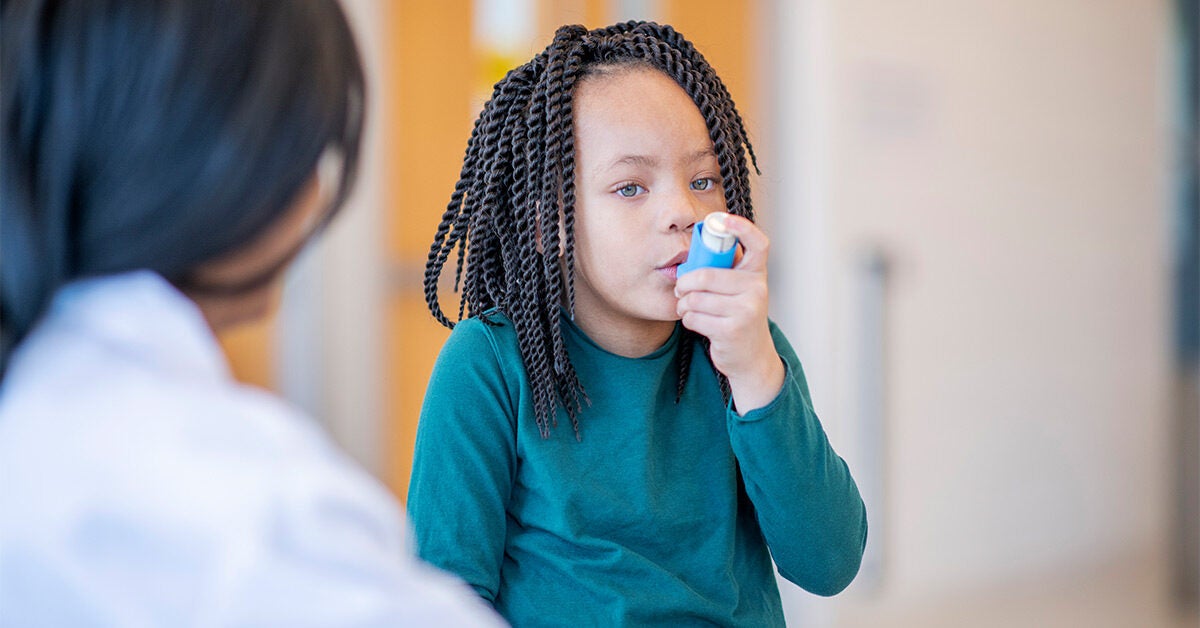What We Know About the COVID-19 Risk for Kids with Asthma - Healthline

- People with well-controlled asthma aren't at greater risk for severe COVID-19 symptoms, but a new study suggests that children with poorly controlled asthma are more likely to be hospitalized with COVID-19.
- Children whose asthma isn't well controlled are 3 to 6 times more likely to be hospitalized with COVID-19 than those without the condition.
- Over 63 percent of people over the age of 5 in the United States have been fully vaccinated against COVID-19.
While 70 percent of adults in the United States are fully vaccinated against COVID-19, it was only in October that the Food and Drug Administration (FDA)
And while experts are pushing for authorization for a wider use of the vaccines in children, new research shows that it may be critical to vaccinate kids who live with poorly controlled asthma.
Though people with well-controlled asthma are not at greater risk for severe COVID-19 symptoms, a new
Even prior to the pandemic, asthma attacks could be fatal in the United States.
"What people don't realize is that we have 10 deaths per day from asthma, even pre-pandemic," said Dr. Purvi Parikh, an immunologist and vaccine researcher at NYU Langone.
"People don't realize the severity of the toll of asthma. It puts you at a higher risk of COVID-19 when you have uncontrolled asthma because you are more likely to catch respiratory viruses and they will be more severe."
Dr. Gina T. Coscia, an allergist-immunologist at Northwell Health, said that having poorly controlled asthma means having airway inflammation that isn't well controlled with medication.
"This inflammation can lead to symptoms of cough, wheeze, breathlessness, and functional impairment, as well as outcomes such as hospitalization or the need for multiple courses of oral corticosteroids," said Coscia.
Poorly controlled asthma is much more common than one might think. "Many people are poorly controlled and don't realize it," added Parikh. "You need two flare-ups in a whole year. Even two courses of steroids or unexpected ER or doctor visits that are unplanned are considered uncontrolled."
For the purpose of this study, poorly controlled asthma was defined as hospitalization for asthma or being prescribed at least two courses of oral steroids in the previous 2 years.
First and foremost, the benefit of the vaccine overall is to reduce the risk of infection and transmission among all people. The COVID-19 vaccines are all proven to be highly effective at reducing the risk of hospitalization or preventing transmission and contraction of the disease in general.
For children with poorly controlled asthma, the vaccine could be the difference between a more serious, life threatening situation versus more mild symptoms, if any at all.
"Based on this study, vaccination of children with poorly-controlled asthma could reduce the risk of infection among these children, thereby decreasing their risk of hospitalization, number of missed days of school and ultimately could reduce the spread of disease," said Coscia.
Some parents have been hesitant to vaccinate children against COVID-19 because the vaccine is so new and misinformation online has contributed to fueling unfounded fears about the vaccine.
But experts stress that the data show the vaccines are safe and effective.
"There is plenty of good information before this to suggest that anyone who could be vaccinated, should be," said Dr. Charles Fishman, a pulmonologist with New York-Presbyterian Medical Group Westchester and an assistant professor of medicine at Columbia University Medical Center.
"If this makes someone who has a child who has asthma less hesitant, then great. My children are grown but if I had young children I would have been first in line [to have them receive the vaccine]. I have been watching people die for almost two years and it is a horrible horrible illness and one we can prevent."
Research on adults with asthma and COVID-19 suggests that adults with poorly controlled asthma are at higher risk for severe outcomes compared to those without poorly controlled asthma.
According to the Asthma and Allergy Foundation of America, people with well-controlled asthma have less severe COVID-19 outcomes than people with poorly controlled or uncontrolled asthma.
Still, it's not a disease that anyone should have to live through. The number one way to avoid getting COVID-19, the flu, or other respiratory infections is to get vaccinated against the viruses that cause them.



Comments
Post a Comment